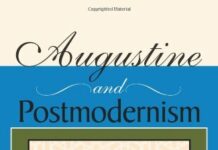
Ebook Info
- Published: 2007
- Number of pages: 160 pages
- Format: PDF
- File Size: 1.17 MB
- Authors: John D. Caputo
Description
This provocative addition to The Church and Postmodern Culture series offers a lively rereading of Charles Sheldon’s In His Steps as a constructive way forward. John D. Caputo introduces the notion of why the church needs deconstruction, positively defines deconstruction’s role in renewal, deconstructs idols of the church, and imagines the future of the church in addressing the practical implications of this for the church’s life through liturgy, worship, preaching, and teaching. Students of philosophy, theology, religion, and ministry, as well as others interested in engaging postmodernism and the emerging church phenomenon, will welcome this provocative, non-technical work.
User’s Reviews
Editorial Reviews: From the Back Cover Many in the church who are wrestling with ministry in a postmodern era view deconstruction as a negative aspect of the postmodern movement. But John Caputo, one of the leading philosophers of religion in America and a leading voice on religion and postmodernism, sees it differently. In this lively and provocative analysis, he argues that in his own way Jesus himself was a deconstructionist and that applying deconstruction to the church can be a positive move toward renewal.”Caputo brilliantly manages to bring thought to life and life to thought. He wears his learning and scholarship so lightly that one has the impression of returning to a flesh-and-blood world where Jesus deconstructs and reconstructs our lives. Challenging, compassionate, witty, and wise. This book is compulsory reading for anyone concerned about the future of Christianity.”–Richard Kearney, Charles Seelig Professor in Philosophy, Boston College”Let this book settle the debate once and for all: postmodern philosophy does not preclude true Christian faith. In fact, taken rightly, postmodernism leads not to nihilistic relativism but to a robust faith in the Savior, who himself was bent on deconstruction. Caputo is a sheep in wolf’s clothing.”–Tony Jones, national coordinator of Emergent Village, author of The New Christians: Dispatches from the Emergent Frontier”This is a marvelous little book. It enables readers to understand deconstruction as the hermeneutics of the kingdom of God and provides a glimpse of what this concept might look like in the hands of Jesus as applied to the church. This will be difficult therapy, and many of us will be inclined to resist. However, let us remember that while discipline is painful in the moment, it produces a harvest of peace and righteousness in the long run. May the church learn from the wisdom found in these pages.”–John R. Franke, professor of missional theology, Yellowstone Theological Institute About the Author John D. Caputo (PhD, Bryn Mawr College) is Thomas J. Watson Professor of Religion and Humanities and professor of philosophy at Syracuse University. He is the author of numerous books, including The Weakness of God (winner of the 2007 AAR Award for Excellence in Constructive-Reflective Study of Religion), On Religion, The Prayers and Tears of Jacques Derrida, and Deconstruction in a Nutshell: A Conversation with Jacques Derrida.
Reviews from Amazon users which were colected at the time this book was published on the website:
⭐John D. Caputo is a professor emeritus at Syracuse University and Villanova University. He has written many other books, such as
⭐,
⭐,
⭐,
⭐,
⭐, etc.He begins this 2007 book by summarizing Charles Sheldon’s book
⭐, noting that “Sheldon was a formative influence on the Social Gospel movement, and he put the gospel personally into practice” (pg. 22) and that “Sheldon thought that if there were ‘saloons’ in Galilee, Jesus would have spoken out against them.” (pg. 24). Then he states, “[This] raises a problem that goes to the heart of asking ‘What would Jesus do?’… The question should be turned first to ourselves so as to put ourselves in question… The ‘would’ in the question carries all this weight… The ‘would’ draws us into what contemporary philosophers call ‘hermeneutics,’ the theory of interpretation…. That is why I here call on the aid of deconstruction… which I sometimes camouflage as ‘radical hermeneutics,’ to help us out.” (Pg. 24-25)He points out that Sheldon’s ‘WWJD’ statement “contains a truth that will take by surprise those who wear it proudly on their T-shirts, those who repeat its question without knowing its history, who may just find themselves deconstructed. What would Jesus do? He would deconstruct a very great deal of what people do in the name of Jesus, starting with the people who wield this question like a hammer to beat their enemies. My hypothesis is that the first thing that Jesus would deconstruct is WWJD itself, the whole ‘industry,’ the whole commercial operation of spiritual and very real money-making Christian capitalists.” (Pg. 31)He explains, “By asking what Jesus would ‘deconstruct’ I am trying to be provocative, but I am also… in earnest about this word ‘deconstruction.’ … in virtue of its deeply biblical resonances, deconstruction provides a felicitous hermeneutic of the kingdom of God… It has prophetic resonances that call for justice to flow like water over the land… I am proposing that what happens in deconstruction has an inner sympathy with the very ‘kingdom of God’ that Jesus calls for… the question turns on the structure of the archive, of memory and repetition. How does the New Testament preserve the memory of Jesus?… I treat the New Testament as an ‘archive,’ a depository of memories, which presents a certain way to be, a certain ‘poetics’… that I like to call a ‘poetics of the kingdom,’ which lays claim to us and which calls for a ‘transformation into existence.’” (Pg. 33)He states, “the church is ‘deconstructible,’ but the kingdom of God, if there is such a thing, is not. The church is a provisional construction, and whatever is constructed is deconstructible, while the kingdom of God is that in virtue of which the church is deconstructible. So, if we ask, ‘What would Jesus deconstruct?’ the answer is first and foremost the church! For the idea behind the church is to give way to the kingdom, to proclaim and enact and finally disappear into the kingdom that Jesus called for, all the while resisting the temptation of confusing itself with the kingdom.” (Pg. 35)He says, “Part of my hypothesis in this little book is that deconstruction and the kingdom of God—I have invested a lot of my time as a professional philosopher trying to set up a shuttle system between these two—are marked by a common love of paradox and aporia and by a common appreciation of the path, not as a well-paved, well-marked superhighway but as an obstructed path, a step/not, a movement of the beyond, of excess, and ultimately of the madness of love.” (Pg. 46)He explains, “In deconstruction, one sets out in search of, or rather, one is oneself searched out or called on by whatever is unconditional, or undeconstructible, in a given order, and it is precisely in virtue of this undeconstructible ‘x’… that everything that does exist is that order is deconstructible… To ‘deconstruct’ is on the one hand to analyze and criticize but also, on the other hand, and more importantly, to feel about for what is living and stirring within a thing, that is, feeling for the event that stirs within the deconstructible structure in order to release it, to set it free, to give it a new life, a new being, a future… That is why deconstruction is affirmation…” (Pg. 68)He suggests, “The more Jesus-inspired thing to do today, in my opinion, is to translate the gospel’s commitment to the poor into an effective public policy that would actually implement an evangelical imperative, to come to the aid of the weakest and most defenseless people in society, above all the children… If Jesus ever said, ‘My money is mine, I worked hard for it and I want to keep it for myself and there are other things that I would rather spend it on than those Samaritans,’ we have lost the manuscript.” (Pg. 93)He argues, “I do not think that, given the spirit of love and forgiveness Jesus embodied, we would find him among the anti-abortion marchers of today. My best guess is that Jesus would be offended by the hypocrisy of a good many of the protesters and merciful about the difficult choice with which women are faced. What would Jesus do if he were to come on an abortion clinic surrounded by an angry crowd of protesters? We do not know. But we do know how he dealt with another angry crowd gathered around a woman… What if after all this shouting they suddenly lose their voice when it comes to addressing the brutal poverty in which unwanted pregnancies abound and by which families are crushed? What if they champion public policies that effectively abandon these children as soon as they are born to the cruelest social and economic conditions?… Faced with accusers like that… my best bet is that Jesus would stoop down, write on the sidewalk, and scatter them.” (Pg. 116)He concludes, “Jesus, I have argued, is the centerpiece of a ‘poetics’ of the ‘kingdom of God’ found in the New Testament, of a kind of theo-poetics… in which the task of converting that poetics into reality falls squarely on our shoulders… So I am always on the look out for ways to make that happen, to make or let the kingdom come, to make the event come true.” (Pg. 134)This book is a very helpful introduction to Deconstruction and Derrida (particularly for Evangelicals).The other books in this “The Church and Postmodern Culture” series are
⭐,
⭐,
⭐,
⭐,
⭐,
⭐,
⭐,
⭐,
⭐.
⭐I usually read about a book a week, typically on theology or philosophy. I had to read this book very slowly, and I will definitely reread it and reread it. It brings the kingdom of God deep into my very being and hopefully will never leave. Derrida is beyond my paygrade, but Dr. Caputo is smart enough to explain Derrida’s thought, which is the most enlightening experience I have had, increasing my love for God and neighbor.
⭐At first I was irritated with Caputo. I have not read Derrida, or even much about his work. I wanted Caputo to introduce me to deconstruction, to tell me what it was, give me some examples. Or,failing that, to at least tell me that he was not going to give me such an introduction but rather just begin deconstructing . . . but he did not do that either. So it was a while before I realized that we were doing deconstruction; had been for a while, in fact. I had to back and re-read whole chapters, trying to locate the moment when he crossed over (which I was unable to do.)By the time we were analyzing Justice and the Law, however, I knew we were in the thick of it . . . my pulse was quickening, my intellect aroused . . . and my soul was stirring. And when we turned to the old familiar terrain of Jesus exhortation to forgive your enemies, I was seeing with new eyes and hearing with new ears.I understand that deconstruction is not something that you do; it is something that happens. And it is happening to me as a result of this stirring introduction to deconstructive theology.I give 4 stars instead of 5 because Caputo’s polemic against the Christian Right seemed a little heavy handed. He made it difficult to discern just when he had left the clear territory of deconstruction and entered the murkier realm of personal opinion.
⭐I posted a pretty lengthy review of this book on my blog, but here’s a little preview:In What Would Jesus Deconstruct?, John Caputo swings his postmodern wrecking ball – deconstruction – against all the cherished forms of religious thought and practice that masquerade as definitive and absolute. Not only is he willing and able to question all representations of statuesque, codified faith, he does so in the name of Christ and claims that his is good news. Caputo presents deconstruction as a loving tool that frees the Church for authentic metanoia – “a fundamental change of heart”[1] – in its own life and ministry. In his words, deconstruction is the “possibility of the impossible” and is therefore the “hermeneutics of the kingdom of God” – a kingdom where the unlovable are loved.[2] While it may seem risky and a little frightening, Caputo believes that the deconstructive way, the via negativa, is the only way forward if the Church is to embody the good news of the kingdom of God in our world today.You can read the rest here:[…]
⭐WWJD? Remember this popularized mantra of the 80’s? What many of those who sported wristbands and rear-view mirror baubles did not realize is that the phrase originates in an 1897 book by Charles Sheldon, entitled “In His Steps, What Would Jesus Do?” This little book examines what could happen in a small Midwestern Christian church should a tramp appear in their midst. Would the parishioners respond in the most basic beatitudinal way? John Caputo returns to this source text and deconstructs current Christianity’s failure to hear the message of Jesus. Highly engaging and extremely reader friendly, that is, unencumbered by heavy scholarly apparatus, this book should be welcome reading to anyone who is willing to consider and reconsider what he/she believes and practices. It may make you uncomfortable, however. Just like the teachings of Jesus should.
⭐The book is at times refreshing, at times opaque, and I guess it will be a marmite book for many – love or hate it.I enjoyed it at points. For example, “To argue … that the use of artificial contraception methods, even among married couples, violates the intention of nature can result only in giving the impression that to be a Christian is to check your rational faculties at the door. One might as well argue that umbrellas are unnatural because they frustrate the intention of nature to make us wet.” The point is well-made, provocative and memorable.But then you get paragraphs like this …”Deconstruction is affirmation, the affirmation of the impossible, of the coming of the event. That is what I called in the preceding chapter the “real beyond the real,” the hyper-real, which participates in the structure of the step/ not beyond. Every time a “deconstructive critique” is undertaken, every time something is criticized as a fiction or an unjustifiable assumption, such critiques “are always advanced in the name of the real, of the irreducible reality of the real, not of the real as the objective, present, perceptible or intelligible thing (res), but of the real as the coming or the event of the other.” But what, then, is the “real”?“The real is this non-negative im-possible, this impossible coming or invention of the event whose thought is not an onto-phenomenology. It is a thought of the event (singularity of the other, in its unanticipatible coming, hic et nunc).” I presume that means something to someone, but it won’t win any Plain English awards.The author advances two models of good practice at the end of the book. The first is a Catholic priest, whose experiences are recorded in “Diary of a City Priest”. I haven’t read the book, but according to Caputo, “Heaven, he says, is for another day, and there is no time to waste on thinking about heaven. “That promise does not figure large in my own prayer or work. It would seem a betrayal of my real task, which is to make life here a little easier”. The second is Ikon, “not a parish but a decidedly postmodern paraliturgical undertaking, an attempt to produce an avant-garde liturgy. No one is ordained, there is no ethical or theological consensus, only a concerted effort to be inclusive, both liberal and conservative, Catholic and Protestant, theist and atheist.” No doubt there are good things to be admired in both, but they are miles away from New Testament Christianity.And underpinning it all is the impression that although the book is about getting to heart of the message of Jesus, stripping away our additions to that message, it slips into taking words and (instead of understanding what they meant then to the original audience) investing them with a new meaning to make them fit conveniently with a different view of the world.
⭐This is excellent and stimulating material for adventurous discussion. Caputo’s thought-provoking approach opens doors for courageous and empowering exploration – enjoy!
⭐I never bought this ; And it does not appear to be the CHRISTIANITY I beleve
⭐Not the easiest book to get into but improves as you get into it
⭐This book is a must read for anyone engaged in the work of the ‘real church’Indeed – “What must be believed cannot be believed—that is the mystery we call God.”Caputo very strong case for deconstruction as a tool for renewal for institutionsI loved this book
Keywords
Free Download What Would Jesus Deconstruct?: The Good News of Postmodernism for the Church (The Church and Postmodern Culture) in PDF format
What Would Jesus Deconstruct?: The Good News of Postmodernism for the Church (The Church and Postmodern Culture) PDF Free Download
Download What Would Jesus Deconstruct?: The Good News of Postmodernism for the Church (The Church and Postmodern Culture) 2007 PDF Free
What Would Jesus Deconstruct?: The Good News of Postmodernism for the Church (The Church and Postmodern Culture) 2007 PDF Free Download
Download What Would Jesus Deconstruct?: The Good News of Postmodernism for the Church (The Church and Postmodern Culture) PDF
Free Download Ebook What Would Jesus Deconstruct?: The Good News of Postmodernism for the Church (The Church and Postmodern Culture)





